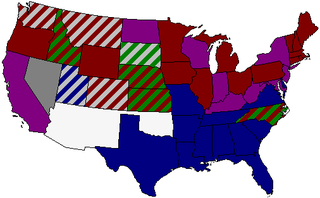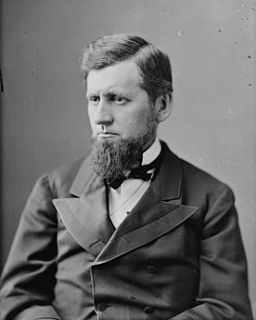
Although the 17th Amendment was not passed until 1913, some states elected their Senators directly before its passage. Oregon pioneered direct election and experimented with different measures over several years until it succeeded in 1907. Soon after, Nebraska followed suit and laid the foundation for other states to adopt measures reflecting the people's will. By 1912, as many as 29 states elected senators either as nominees of their party's primary or in conjunction with a general election.

The United States Senate elections of 1908 and 1909, some states elected their senators directly even before passage of the 17th Amendment in 1913. Oregon pioneered direct election and experimented with different measures over several years until it succeeded in 1907. Soon after, Nebraska followed suit and laid the foundation for other states to adopt measures reflecting the people's will. By 1912, as many as 29 states elected senators either as nominees of their party's primary or in conjunction with a general election. The Republicans lost two seats overall.
The United States Senate elections of 1848 and 1849 were elections which had the Democratic Party lose seats but maintain control of the United States Senate.

The United States Senate elections of 1858 and 1859 were elections which had the Republican Party gain five additional seats in the United States Senate, but the Democrats retained their majority. That majority would erode in 1860 with the secession of the southern states leading up to the Civil War. In Illinois, incumbent Stephen A. Douglas (D) and challenger Abraham Lincoln (R) held a series of seven debates, known as the "Lincoln–Douglas debates."

The United States Senate elections of 1896 and 1897 were elections in which the Democratic Party lost seven seats in the United States Senate, mostly to smaller third parties.
In the United States Senate elections of 1870 and 1871, the Republican Party lost five seats in the United States Senate, though it still retained an overwhelming majority. In advance of these elections, the last four seceded states were readmitted to the Senate.
The United States Senate elections of 1872 and 1873 were elections which had the Republican Party, while still retaining a commanding majority, lose two seats in the United States Senate. By the beginning of the Congress, however, they'd lost three more: two as defections to the Liberal Republican Party, and one a resignation of Henry Wilson to become U.S. Vice President. These elections also coincided with President Ulysses S. Grant's easy re-election.

The United States Senate elections of 1898 and 1899 were landslide elections which had the Republican Party gain six seats in the United States Senate.

The United States Senate elections of 1902 and 1903 were elections which had the Democratic Party gain three seats in the United States Senate, but the Republicans kept their strong majority.
The United States Senate elections of 1878 and 1879 were elections which had the Democratic Party retake control of the United States Senate for the first time since before the Civil War.
The United States Senate elections of 1884 and 1885 were elections that coincided with the presidential election of 1884. Both Republicans and Democrats lost seats in the United States Senate due to the failure of three state legislatures to finish elections in time. Republicans, nevertheless, retained majority control and the Readjusters joined their caucus. By the beginning of the first session, in December 1885, Republicans had won all three vacant seats, increasing their majority.
The United States Senate elections of 1886 and 1887 were elections that had the Republican Party lose two seats in the United States Senate. At the beginning of the 50th Congress, therefore, Republicans had the slimmest possible majority due to a vacant Democratic seat: 38 out of 75 seats. Once that vacancy was filled, Republicans maintained control as the single Readjuster Senator caucused with them.
The United States Senate elections of 1890 and 1891 were elections in which the Republican Party lost four seats in the United States Senate, though still retaining a slim majority. That majority was increased, however, upon the admission of two more states with Republican senators.

The United States Senate elections of 1906 and 1907 were elections which had the Republican Party gain three seats in the United States Senate, expanding their majority to more twice that of the opposing Democratic Party.
The United States Senate elections of 1892 and 1893 were elections which, corresponding with former Democratic President Grover Cleveland's return to power, had the Republican Party lose nine seats in the United States Senate and lose its majority to the Democratic Party. The Democratic majority, however, was minimal and didn't last past the next Congress.
The United States Senate elections of 1866 and 1867 were elections that saw the Republican Party gain two seats in the United States Senate as several of the Southern States were readmitted during Reconstruction, enlarging their majority.
The United States Senate elections of 1864 and 1865 were elections corresponding with Abraham Lincoln's re-election, with the Republican Party gaining two seats in the United States Senate. As these elections occurred during the Civil War, most of the Southern States were absent.

Robert Carlyle Byrd was an American politician who served as a United States Senator from West Virginia for over 51 years, from 1959 until his death in 2010. A member of the Democratic Party, Byrd previously served as a U.S. Representative from 1953 until 1959. He is the longest-serving U.S. Senator in history. In addition, he was, at the time of his death, the longest-serving member in the history of the United States Congress, a record later surpassed by Representative John Dingell of Michigan. Byrd was the last remaining member of the U.S. Senate to have served during the presidency of Dwight Eisenhower, and the last remaining member of Congress to have served during the presidency of Harry S. Truman. Byrd is also the only West Virginian to have served in both chambers of the state legislature and both chambers of Congress.

Washington, D.C., formally the District of Columbia and commonly referred to as Washington or D.C., is the capital of the United States. Founded after the American Revolution as the seat of government of the newly independent country, Washington was named after George Washington, first President of the United States and Founding Father. As the seat of the United States federal government and several international organizations, Washington is an important world political capital. The city is also one of the most visited cities in the world, with more than 20 million tourists annually.
The United States Government Publishing Office (GPO) is an agency of the legislative branch of the United States federal government. The office produces and distributes information products and services for all three branches of the Federal Government, including U.S. passports for the Department of State as well as the official publications of the Supreme Court, the Congress, the Executive Office of the President, executive departments, and independent agencies.








